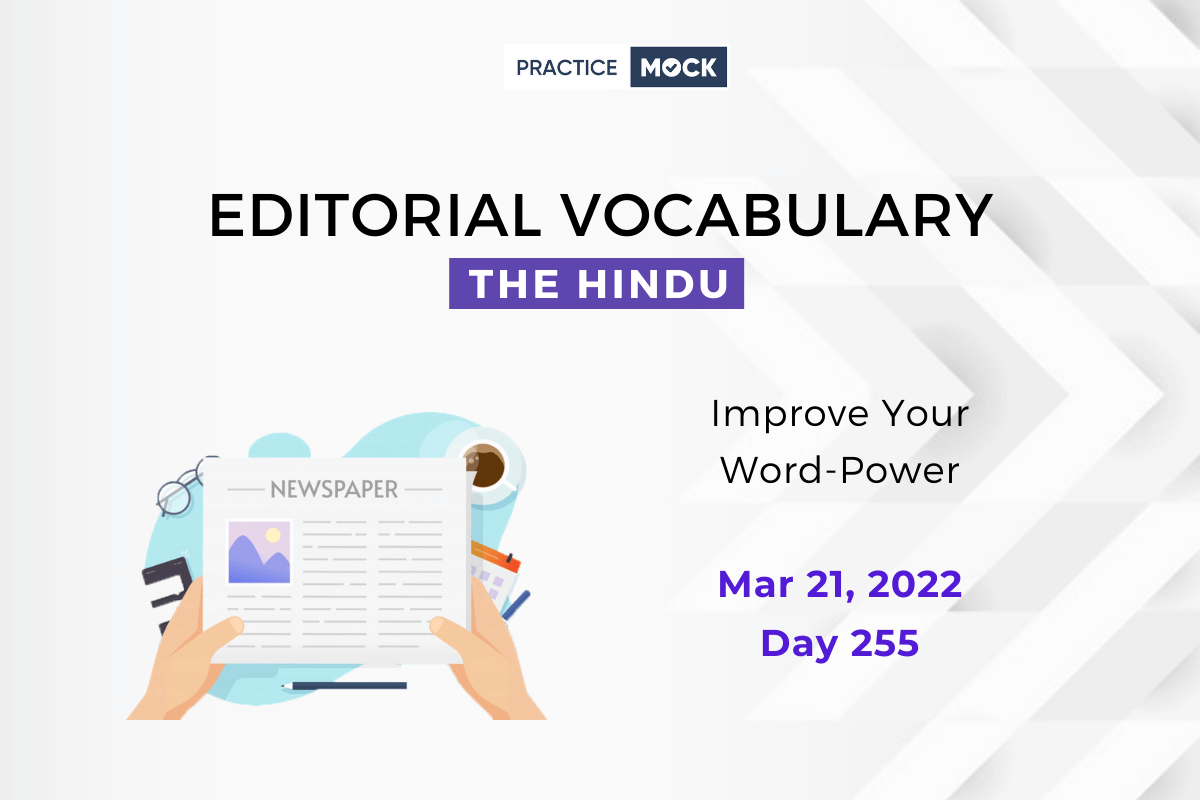| Difficult Word/ Phrase | Contextual Sense |
| Blues | A state of depression |
| Embark on | to begin (something that will take a long time or happen for a long time) |
| Efficacy | Capacity or power to produce a desired effect |
| At large | In a general fashion |
| Catapult | to move at a breakneck speed |
| Benevolence | an inclination to do good |
| Prolonged | Relatively long in duration |
| Dampen | Lessen in effect |
| Slash | Cut drastically |
| Spur | Stimulate |

The spring blues (A state of depression): On India’s recovery two years into the pandemic
A fresh guard is needed to nurture India’s fledgling economic recovery from the pandemic
This week, India will complete two years since the Government embarked on ( to begin (something that will take a long time or happen for a long time)) what is now considered the harshest and quickest lockdowns in the world in a bid to block entry points for the infectious COVID-19 virus. The efficacy (Capacity or power to produce a desired effect) of that lockdown, both in terms of curbing infection rates (and mortality rates) and the accompanying hardships imposed on the population at large (In a general fashion), can be debated at length. There is, however, little argument over the massive economic costs for the country. The Reserve Bank of India has underlined that some of that damage to India’s GDP is permanent. This can be linked to businesses shutting shop for good, labourers migrating home (with many choosing not to return) and consumers turning increasingly reluctant. The rebuilding effort remains a work in progress, although record tax collections would suggest that all is well. Personal consumption and employment-driving contact-intensive sectors remain below pre-pandemic levels, even as other macro metrics have surpassed pre-COVID performance. Just as the virus appeared to be ebbing, triggering hopes of a revival in consumer confidence, the Russia-Ukraine conflict has thrown up fresh challenges, including high commodity and crude oil prices.
Health-care costs are considered a key factor for pushing several middle- and lower-income households below the poverty line, while high inflation affects all economic actors. The Russia-Ukraine situation has not only catapulted (to move at a breakneck speed) gas, oil and coal prices higher but also fertilizers, wheat, corn, and seed oil. A section of farmers growing crops such as wheat may gain, but inflation in essential items such as food and transport, will impact the poor the most. For now, India’s oil marketing companies, who the Government has argued determine the retail prices of fuel, have shown extreme benevolence (an inclination to do good) in holding rates at November 2021 levels and this may persist till Parliament’s current session ends. This is, however, not fiscally sustainable, just as the Finance Ministry has argued that high global commodity prices are not. A prolonged (Relatively long in duration) conflict in Europe could tip the global economy into recession, even as monetary policy missteps and social risks associated with high inflation, could dampen (Lessen in effect) growth, Moody’s Investors Service warned last week. On the other hand, the Government’s robust direct tax collections that have surpassed even revised estimates by ₹1.13 lakh crore, give it room to not just push forward the LIC share sale till market volatility subsides but also slash (Cut drastically) fuel taxes further, curb other inflationary pressures and expand the COVID-19 booster shots coverage. Unless people get more certainty about the pandemic’s end-game, and have some money in their hands, it would be difficult to spur (stimulate) consumption enough to reach the necessary next stage of the recovery — a revival in private investments.

Want to improve your vocabulary further? Download the Lists of Word-Meanings of Previous Months here.
- Sign Up on Practicemock for Updated Current Affairs, Free Topic Tests and Free Mini Mocks
- Sign Up Here to Download Free Study Material
Free Mock Tests for the Upcoming Exams
- IBPS PO Free Mock Test
- RBI Grade B Free Mock Test
- IBPS SO Free Mock Test
- NABARD Grade A Free Mock Test
- SSC CGL Free Mock Test
- IBPS Clerk Free Mock Test
- IBPS RRB PO Free Mock Test
- IBPS RRB Clerk Free Mock Test
- RRB NTPC Free Mock Test
- SSC MTS Free Mock Test
- SSC Strenographer Free Mock Test
- GATE Mechanical Free Mock Test
- GATE Civil Free Mock Test
- RRB ALP Free Mock Test
- SSC CPO Free Mock Test
- AFCAT Free Mock Test
- SEBI Grade A Free Mock Test
- IFSCA Grade A Free Mock Test
- RRB JE Free Mock Test
- Free Banking Live Test
- Free SSC Live Test



